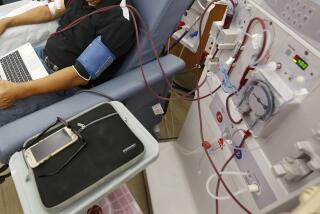Donor gave kidney, plus HIV, to recipient
- Share via
HIV transmission via live organ donation can still happen. To be more specific: It has now happened for the first time since 1989. A person suffering from kidney failure -- who had no known history of sexually transmitted infections, injection drug use or high-risk sexual activity -- was given a kidney, and HIV, in 2009.
The New York City case marks the first known HIV transmission of this type in the U.S. since 1985, when laboratory screening for HIV became available. An account in this week’s Morbidity and Mortality Weekly Report from the CDC has the details....
The transplant team knew the donor, a male, had previously been treated for syphilis and that he’d had sex with men, but laboratory tests 79 days before transplant had found no evidence of the human immuno-deficiency virus, hepatitis B or hepatitis C. The operation commenced.
Afterward, the recipient, who tested negative for HIV 12 days before the transplant, did not have a problem-free recovery. In fact, multiple hospitalizations were required, and there were fears the kidney would be rejected.
A year later, the recipient was diagnosed with HIV. So was the donor. The detective work commenced.
The upshot: The donor was infected after screening negative. The recipient, obviously, was then infected as well.
The account notes, in remarkable understatement: “Reports of confirmed, donor-derived HIV transmission are rare but notable and have important implications for public health when they occur despite screening.”
The CDC is now recommending:
-Additional HIV screening -- and as close as possible to the time of transplant.
-Telling donors not to engage in behavior that would increase their risk of HIV infection.
-Counseling donors known to have engaged in risky behavior precisely how to avoid further such behavior.
-Explaining that, you know, organ transplants carry risk.
Transplant Living, operated by the United Network for Organ Sharing, lists the tests involved with becoming a living donor.
There’s tissue typing, cross-matching, an antibody screen, urine tests, X-rays, an arteriogram, a psychiatric evaluation, a gynecological exam (for female donors) and a final blood test. As of now, that test is essentially another cross-match.
It would appear there’s room for another test in there.
More to Read
Sign up for Essential California
The most important California stories and recommendations in your inbox every morning.
You may occasionally receive promotional content from the Los Angeles Times.










